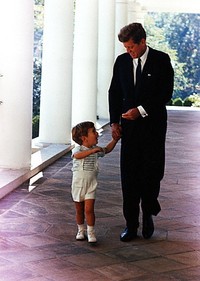Here’s how you can use my generational thesis to analyze current political actors.
First, think of the pattern as a wave. Each crisis election is the bottom of the wave. The high point of each new thesis is at the top of the wave, with the AntiThesis period and Excess period sending the wave back to its bottom.
Now, look at a subject politician seriously (or look at yourself) and try to figure out what year they are living in. Once you have that, you know where they expect political forces to line up, you know what presses their buttons. And hopefully you can deal with them.
As we discussed yesterday, Joe Lieberman lives in 1962, the High Kennedy period. This was the start of the excess which destroyed the New Deal coalition. It was the early part of the Civil Rights Era, when the issue really was black-and-white. Once you understand this about Lieberman, and pin that year on him, you can understand what he considers his own best self and deal with it.
We also discussed Lester Maddox yesterday. Here’s a quiz: what year was he living in?
(No peeking.)
That’s right, 1925, a time when Democratic populism was represented by
William Jennings Bryan (or Thomas E. Watson if you prefer) and the assumptions of segregation were not questioned.
You can use this technique to see any politician with new eyes. Instead of complaining about how they don’t get today, you’ll at least be able to walk a bit in their shoes, and fit your own attempts to deal with them into that context.
For Jim Webb the year is 1966. Webb is fighting hard in Vietnam, and the fight is being stabbed in the back by the hippies. Webb has spent his life trying to deal with that experience. It drove him to becoming a Republican, even joining the Reagan cabinet, and it drove him out when he felt high officials were wasting good men. He is, and was, and always will be trying to reconcile that last crisis in his mind. The most important part of his campaign wasn’t Macaca, or his victory, but deciding to run in the first place, as a Democrat. That act started to close the circle, and begin true healing. In some ways he is reborn, but part of him will always be in the jungle.
For Barney Frank, meanwhile, the year is 1983. He is fighting a rear-guard action against the High Thesis of Reaganism, and expects reward for getting the best deal he can. Meanwhile, there’s all this sexual stuff going on in the background, stuff that will shortly explode (the way grenades did in Webb’s mind, or Bull Connor’s water cannon in Lieberman’s).
Trauma is usually what sets a year in your mind and your heart. And when you know where in time that trauma comes from you have a better chance of dealing with it, either turning them to your side or taking them out of politics altogether.
We’ll talk more about this….













I suppose “my year” is 1974, then, because the next year is the one when I really realized that what was won (to the extent that it was won) in the years before then wasn’t necessarily secure–that this nation really could go backward socially and politically. It’s a heck of a thing to realize when you’re just twelve. :-/
I suppose “my year” is 1974, then, because the next year is the one when I really realized that what was won (to the extent that it was won) in the years before then wasn’t necessarily secure–that this nation really could go backward socially and politically. It’s a heck of a thing to realize when you’re just twelve. :-/